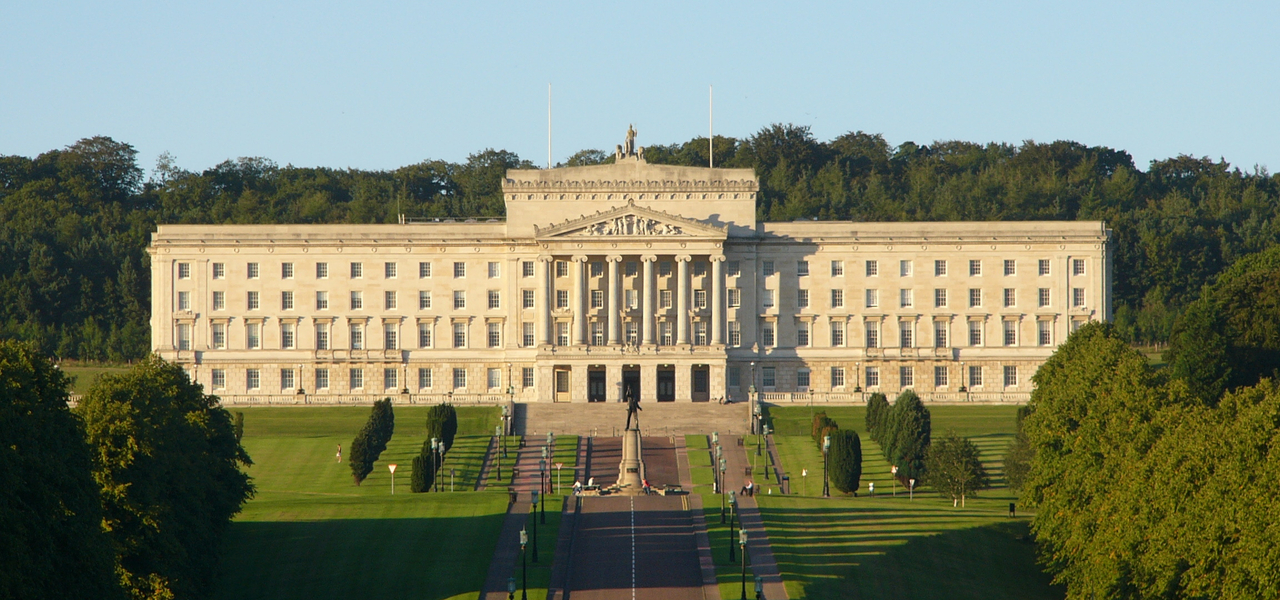The Northern Ireland Assembly, which was restored in 1999 following the Good Friday Agreement, is the devolved legislature for Northern Ireland. It consists of one chamber, and has power to legislate in a variety of policy areas that are not explicitly reserved to the Westminster Parliament, and to appoint the Northern Ireland Executive. It sits at Parliament Buildings at Stormont in Belfast.
The Assembly is based on the principle of power-sharing to ensure that Northern Ireland’s largest political communities, the unionist and nationalist communities, both participate in governing the region.
Election
Elections to the Northern Ireland Assembly are conducted using a Proportional Representation election system. A constituent’s vote is initially allocated to his or her most preferred candidate, and then, after candidates have been either elected or eliminated, any surplus or unused votes are transferred according to the voter’s stated preferences. Northern Ireland is currently divided up into eighteen constituencies with each being represented by six Members of the Legislative Assembly (MLAs). Elections to the Assembly are usually held every four years.
Membership
90 MLAs are elected to sit in the Northern Ireland Assembly.
Powers
The Assembly only has the power to enact legislation in areas where power has been transferred to it from the Westminster Parliament. At the current time the Assembly has the ability to legislate in a wide range of areas including Health, Education, Culture, Justice and the Environment. Powers reserved by Westminster are divided into ‘excepted matters’, which it retains indefinitely, and ‘reserved matters’, which may be transferred to the competence of the Assembly at a future date.
How laws are passed
First Stage: A Minister or Member introduces the Bill to the Assembly.
Second Stage: This is the first opportunity for all MLAs to debate the general principles of the Bill. At the end of the debate, MLAs vote to decide whether to agree to the Bill’s Second Stage.
Committee Stage: This involves detailed consideration of the Bill. The Committee normally takes evidence from interested bodies and individuals, and discuss possible amendments.
Consideration Stage: The Bill is debated by the whole Assembly. MLAs vote on each clause and proposed amendments.
Further Consideration Stage: This is the final opportunity to amend the Bill. This time the debate is limited solely to new amendments. If there are no amendments, there is no debate.
Final Stage: Members debate and vote on whether to pass the Bill.
Royal Assent: Following all its stages in the Assembly, a Bill must receive Royal Assent before it can become an Act of the Northern Ireland Assembly.
Cross Community Support Mechanisms
Certain resolutions brought before the Assembly must receive ‘cross community support’, or the support of a minimum number of MLAs from both communities, to be passed by the Assembly.
Every MLA officially designates themselves as nationalist, unionist or other. The election of the Speaker, any changes to the standing orders and the adoption of certain money bills, all require cross-community support.
Any vote taken by the Assembly can be made dependent on cross-community support if a petition of concern is presented to the Speaker. A petition of concern requires the backing of at least 30 MLAs to be considered. In such cases, a vote on proposed legislation will only pass if supported by a weighted majority (60%) of members voting, including at least 40% of each of the nationalist and unionist designations present and voting. This effectively means that, provided enough MLAs from a given community agree, that community (or a sufficiently large number of MLA’s from that community) can exercise a veto over the Assembly’s decisions.
For more information: www.niassembly.gov.uk
